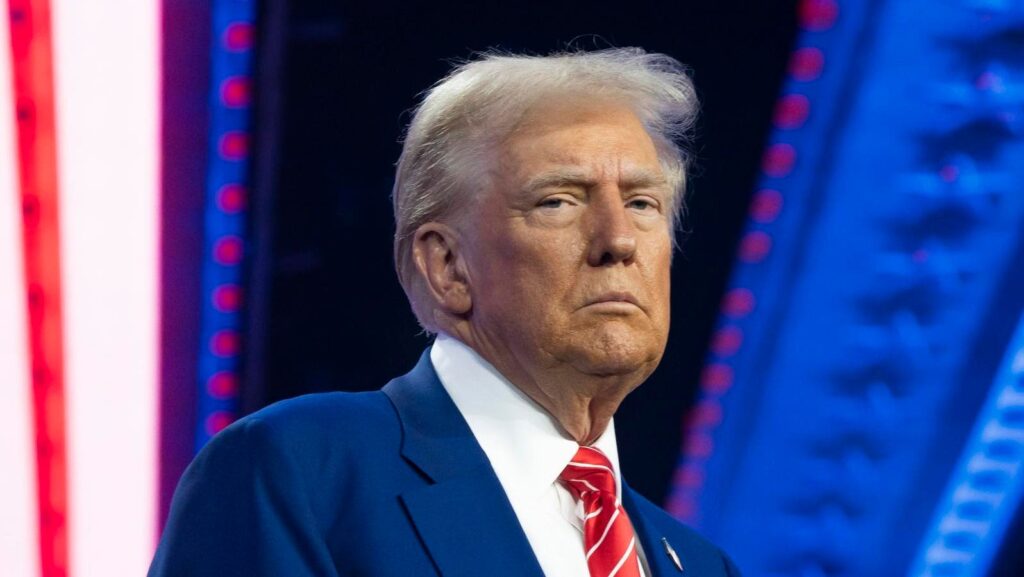Topline
President-elect Donald Trump’s criminal sentencing will take place Friday in Manhattan as scheduled, as the Supreme Court rejected his last-ditch effort to have the guilty verdict against him thrown out—though the president-elect is still unlikely to face many, if any, penalties for his crimes.
President-elect Donald Trump looks on during Turning Point USA’s AmericaFest at the Phoenix … [+]
Key Facts
The Supreme Court ruled 5-4 against granting Trump’s request to pause the sentencing, noting conservative-leaning Justices Clarence Thomas, Samuel Alito, Neil Gorsuch and Brett Kavanaugh would have granted his request.
Trump asked the high court Wednesday to pause his sentencing and consider whether the guilty verdict against him should be thrown out, after New York Judge Juan Merchan, who oversaw his trial, and two New York appeals courts all refused to stop his sentencing.
Merchan last week scheduled the sentencing for Friday and has twice rebuked Trump’s efforts to have the verdict thrown out, as Trump claims evidence used at trial violates the Supreme Court’s ruling giving him some immunity and argues he should not be allowed to be prosecuted as the president-elect.
The Manhattan District Attorney’s office, which brought the case against Trump, asked the Supreme Court to reject Trump’s request, arguing the high court doesn’t have jurisdiction to hear the case—since it’s taking place in state court and is still ongoing—and that even if it did, the sentencing doesn’t infringe on Trump’s impending presidency and shouldn’t be paused.
The Supreme Court said in its ruling Thursday that Trump can appeal his concerns about the verdict against him through the usual appeals process, and it won’t pause his sentencing because the event will impose a “relatively insubstantial” “burden” on Trump and his transition responsibilities, citing “the trial court’s stated intent to impose a sentence of ‘unconditional discharge’ after a brief virtual hearing.”
Trump responded to the Supreme Court’s decision on Truth Social on Thursday, saying he “appreciate[s] the time and effort of the United States Supreme Court in trying to remedy the great injustice done to me”—even as the court ruled against him—and slammed his guilty verdict, saying he is “innocent of all of the Judge’s made up, fake charges” and will be appealing the case.
What To Watch For
Trump’s sentencing will take place at 9:30 a.m. EST on Friday in Manhattan, though the president-elect is expected to attend virtually.
What Will Trump’s Sentence Be?
Trump is not expected to face many, if any, penalties at his sentencing. Merchan said last week he’s inclined to grant an “unconditional discharge”—meaning Trump’s conviction would stand, but he won’t face any punishments—and was not likely to impose any prison time. The Manhattan DA’s office said it does not oppose the unconditional discharge. If Trump did face any penalty, he could be ordered to pay up to $170,000 in fines, based on a maximum $5,000 fine for each of his 34 counts—though other punishments, like probation, would likely be logistically difficult given his impending presidency.
Tangent
Rep. Jamie Raskin, D-Md., the ranking member on the House Judiciary Committee, asked Justice Samuel Alito to recuse himself Thursday from considering Trump’s sentencing and hush money case, following reports that Alito spoke on the phone with Trump hours before the president-elect asked the justices to pause his sentencing. Alito has defended the phone call, saying he was asked to take a call from Trump in order to discuss a former law clerk who’s seeking a job in his administration, and he did not discuss the sentencing case or any other Trump-related legal matters with the president-elect. Alito did not recuse himself from the court’s ruling Thursday.
Key Background
A jury convicted Trump in May on 34 felony counts of falsifying business records, based on his reimbursement checks to ex-attorney Michael Cohen for a hush money payment to adult film star Stormy Daniels before the 2016 election. Trump’s sentencing was initially set for July but was repeatedly postponed at Trump’s request, first to September and then until November—after the election. It was then postponed indefinitely after Trump’s victory, before Merchan scheduled it for Jan. 10. The judge’s ruling scheduling the sentencing was unexpected, as prosecutors had suggested Trump should be sentenced after he left office or have his sentencing dropped entirely. Merchan argued the last-minute sentencing before Trump’s inauguration was the president-elect’s own doing after he repeatedly delayed the sentencing, however, and in delaying it past Election Day, Trump should have been prepared for it to take place even if he won. The judge then refused to pause the sentencing when Trump said he was planning to appeal the judge’s ruling, and a New York appeals court followed suit. New York’s highest court also declined to pause the sentencing Thursday morning, while the Supreme Court was deliberating on its ruling.
Further Reading
Read the full article here
